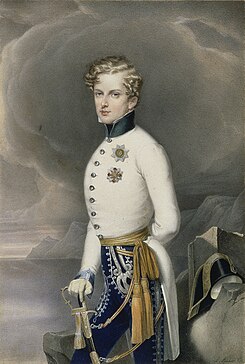Napoleon II
Napoléon François Charles Joseph Bonaparte (20 March 1811 – 22 July 1832) was the son of Napoleon and Marie Louise of Austria.
| Napoleon II | |||||
|---|---|---|---|---|---|
 Portrait by Leopold Bucher | |||||
| Emperor of the French Disputed | |||||
| Tenure | 22 June 1815 – 7 July 1815 | ||||
| Predecessor | Napoleon I | ||||
| Successor | Louis XVIII as King of France and Navarre | ||||
| Regent | Joseph Fouché | ||||
| King of Rome | |||||
| Tenure | 20 March 1811 – 11 April 1814 | ||||
| Duke of Reichstadt | |||||
| Tenure | 22 July 1818 – 22 July 1832 | ||||
| Born | 20 March 1811 Tuileries Palace, Paris, French Empire | ||||
| Died | 22 July 1832 (aged 21) Schönbrunn Palace, Vienna, Austrian Empire | ||||
| Burial | Les Invalides, Paris, France | ||||
| |||||
| House | Bonaparte | ||||
| Father | Napoleon I, Emperor of the French | ||||
| Mother | Archduchess Marie Louise, Duchess of Parma | ||||
Early life
changeNapoléon II was born in Paris in 1811. In 1814, Napoleon I was defeated during the War of the Sixth Coalition and then forced to resign by his own officers. Napoleon I originally wanted Napoleon II to succeed him, but that was rejected by the coalition. Napoleon II and his mother went into exile in Austria, and Napoleon I was exiled to Elba. In 1815, Napoleon I escaped and retook control of France, but he was forced to resign again after his defeat at the Battle of Waterloo.
Emperor of the French
changeNapoleon was arguably the Emperor of the French in late June and early July 1815.
Life in Austria
changeNapoleon spent most of his life in Austria, where he was known as Franz. He became the Duke of Reichstadt at the age of seven and joined the Austrian Army when he was twelve.
Napoleon enjoyed a close relationship with Princess Sophie of Bavaria. It has been claimed that he was the father of Sophie's son, the future Maximilian I of Mexico, but that is widely rejected by historians.
Death
changeNapoleon died of tuberculosis on July 22, 1832.
Remains
changeIn 1940, Adolf Hitler had Napoleon's remains moved from Vienna to the dome of Les Invalides, in Paris. His remains were buried next to his father's for some time but were later moved to the lower church.
Legacy
change- Napoleon II was also known as "The Eaglet" (L'Aiglon). Edmond Rostand wrote a play, L'Aiglon, about his life.
- The Serbian composer Petar Stojanović composed an operetta about him in the 1920s.
- Arthur Honegger and Jacques Ibert worked together on an opera, L'Aiglon, which premiered in 1937.
- The journalist Henri Rochefort joked that Napoleon II, who never really governed, was France's best leader since he brought no war, taxes or tyranny.
Sources
change- Welschinger, Le roi de Rome, 1811-32, (Paris, 1897)
- Wertheimer, The Duke of Reichstadt, (London, 1905)